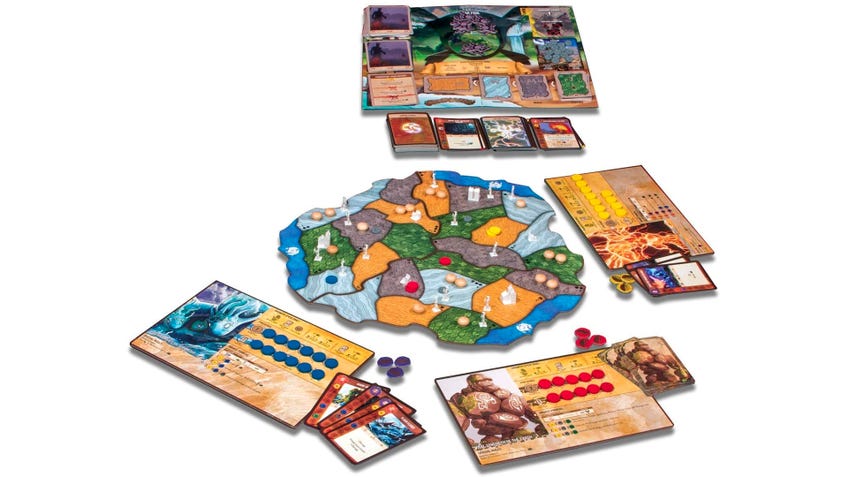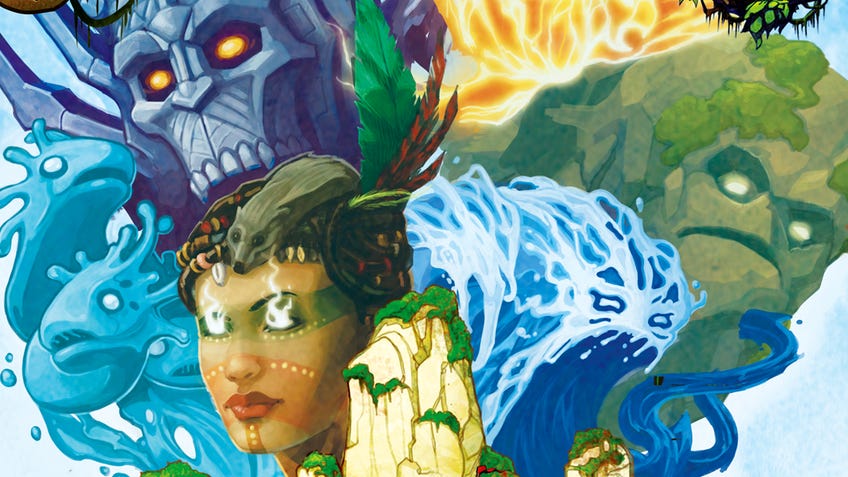Spirit Island is an outstanding co-op game because it’s about doing genuine good
Taking lessons from the tabletop.
Co-op board games provide their own unique kind of enjoyment. Rather than scheming against your friends, co-op games allow you to all bond together against a collective enemy. Whether you win or lose, co-op games always feel that much more forgiving to play because at least you’re doing it together. It’s why they’re such a good option for people who are still new to tabletop games, as it avoids - or at least softens - the risk of feeling disheartened by defeat.
Whilst I wouldn’t recommend Spirit Island to beginner board gamers – it's a bit complicated for people who haven’t got much experience – I do think it’s an example of an excellent co-op board game. Taking place on a fictional island, Spirit Island is a game about protecting your home from invading forces. As deities of the island, players take on the role of supernatural protectors, harnessing their unique powers to crush the invaders’ cities, wipe out their industrial corruption and scare off their troops.

The gameplay mechanics of Spirit Island certainly help make it a fantastic co-op game, with its pacing following that tried-and-tested formula of players operating in a damage control-style mode – virtually guaranteeing that they’re on the edge of their seats by the end. But it’s the game’s thematic aspects that push it above many of its contemporaries and seals its reputation as one of the best – if not the best – co-op board games ever made.
Spirit Island is primarily a board game about fighting against colonisation and helping to protect a vulnerable group.
Co-op board games naturally have the ability to band players together against an incoming threat, whether it’s the danger of spreading disease in Pandemic or terrifying creatures stalking the halls in Mansions of Madness. However, Spirit Island offers something that many other co-op games do not – the opportunity to feel like you’re doing something genuinely good. Certainly, the majority of co-op games depict players as being on the right side of a conflict, regardless of the morals behind it, but co-op board games rarely put their players in a situation where their actions in-game could be associated with making positive change in real life.
Most of the time this is because a lot of co-op games take place in fantastical settings, whether that’s Familiar Tales’ quaint fantasy game world or Eldrich Horror’s horrifying facsimile of the roaring twenties. Yet, it’s pretty hard to relate shooting a cultist in a board game to anything you could do in real life. Spirit Island does have plenty about it that’s fantastical, particularly the fact that players control deities with the power to rain fire over their enemies. The difference is that Spirit Island is primarily a board game about fighting against colonisation and helping to protect a vulnerable group being targeted by people more powerful than them.
Having the power to perform genuine good – even on a fictional island populated by fictional people – feels fantastic.
Spirit Island may be set in on a fictional island with fictional gods, but its anti-colonialist and anti-establishment messages ring loud and clear. The history of colonialism is a long and bloody one, with empires held by Britain, France, Spain and other colonising nations resulting in centuries of murder, theft, slavery and other heinous crimes. Tabletop gaming’s relationship with colonialism has traditionally been a disappointing one, with popular board games such as Catan and Port Royal presenting a very blasé attitude towards a bloody history of racial oppression and imperialism. However, there have also been some examples of positive changes happening across the industry, with titles like Puerto Rico being remade to remove its colonialist elements.
Still, it’s not enough that board games are distancing themselves from colonialism when Spirit Island proves that you can make an excellent tabletop title that’s actively anti-colonialist. It feels good to destroy invaders’ cities and scare off their troops not just because that’s what players have to do to win, but because it feels good to do it. Hurling invading soldiers off the native Dahan's land feels good in a thematic sense as well as a gameplay one. You want to work together with your fellow gods against the colonisers because it’s the right thing to do, not just because it’s the thing that the rulebook tells you to do. Having the power to perform genuine good – even on a fictional island populated by fictional people – feels fantastic and makes playing Spirit Island that much more enjoyable.
Especially now, where it feels like the world continues to dive head-first into absolute shit, being able to do something genuinely good – working with a community to fight back against a band of entitled bastards - helps just a little bit. The desire to kick the invaders off the island is what drives you to play Spirit Island, and what makes it such an amazing co-op game. I want to see more co-op games enable their players to fight against forms of real-world oppression, to allow them to do genuine good - even if it’s in a fictional situation. It might just inspire them to go out and do some good in the real world.



